Vivian Li is a piano pedagogue who teaches at the Xinghai Conservatory of Music in China. I became curious about her after watching a documentary, Pianoforte. Part of the documentary features Vivian’s student, Hao Rao, a Finalist in the 18th Chopin International Competition. Vivian traveled with Rao to Poland to prepare him for the competition. In this interview, Vivian shares how and what influences her as a devoted piano teacher today.
Hao Rao in the final round of the 18th Chopin Competition – Concerto in E minor, Op. 11
What is your piano journey, from being a piano student to being a piano teacher?
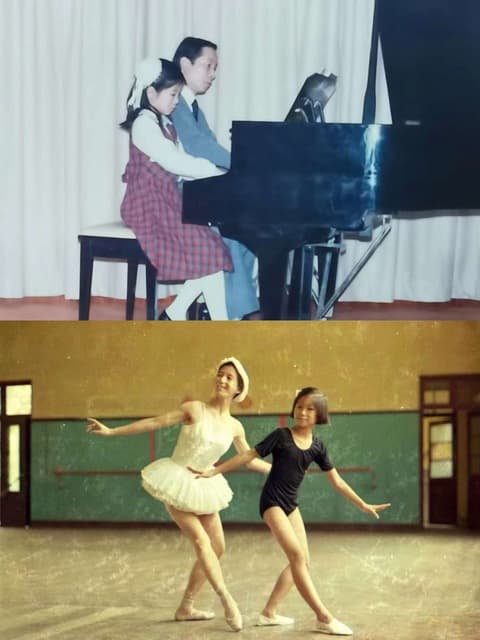
Vivian Li playing duet with her dad; bottom: Vivian Li taking ballet with her mom
That’s a long story. My father is my first piano teacher. He was a concert pianist who was the director of the Guangzhou Symphony Orchestra. He has taught for a long time, and even now that he is 82, he still teaches. From a very young age, my dad started training me professionally, which made a smooth transition from my early studies to my undergraduate studies in the States. I studied with my dad until I began my undergraduate at the Oberlin Conservatory, where I met my second teacher, Monique Duphil. She is one of my most influential teachers and a great person who has significantly impacted me. I am very lucky in my whole process of being a piano student; every teacher I met is not just an amazing teacher but also a wonderful person. Since I was a kid, I have seen how important and inspiring a teacher can be to people around the teacher and also to students. It is a lifetime influence, so maybe that’s why it is like a seed planted in my heart that made me want to be a piano teacher. I love how I communicate through music, not just for playing but also through teaching them. It is fascinating to me to revive something written 100 years ago and bring it back to our time with our instrument.
As a teacher, I communicate with so many students from different backgrounds, cultures, and personalities, so it’s really fun. I am a person that I cannot be bored. I love new adventures and novelties every day, which suits my personality as a teacher, communicating and working with different students.
What was it like to be your dad’s student? Did you take lessons every day?
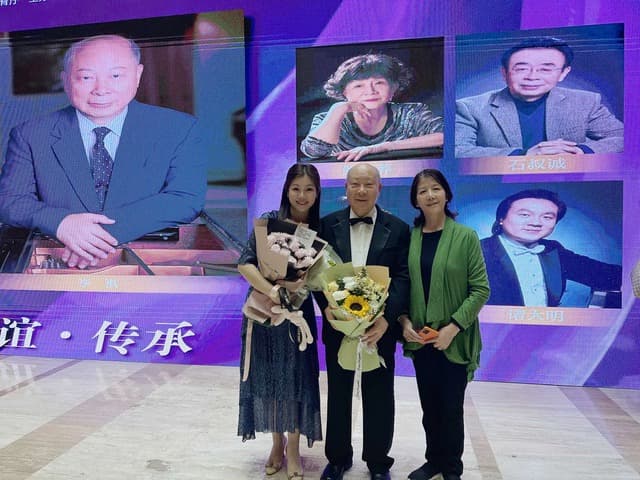
Vivian and her parents. It was taken after her father’s 80th Birthday Recital, featuring himself with his old pianist friends
and some of his most significant students, including Vivian
Not every day. He used to have a very busy concert schedule, and he practiced a lot. We usually had serious lessons once or twice a week, but it was more before some of my concerts and competitions. We practiced at home in different rooms; sometimes, he corrected me when he heard me playing something wrong. So, I would say that my practice was often very efficient. He really gave me a solid foundation of pianism.
Vivian told me her mom was a ballerina at the Guangdong Dance Opera Company. Before moving to Toronto at age 12, she lived in a community provided by the Guangzhou Symphony Orchestra and Guangdong Dance Opera Company, where she grew up surrounded by musicians, dancers, and artists.
In addition to your dad, how did other teachers influence you as a teacher today?
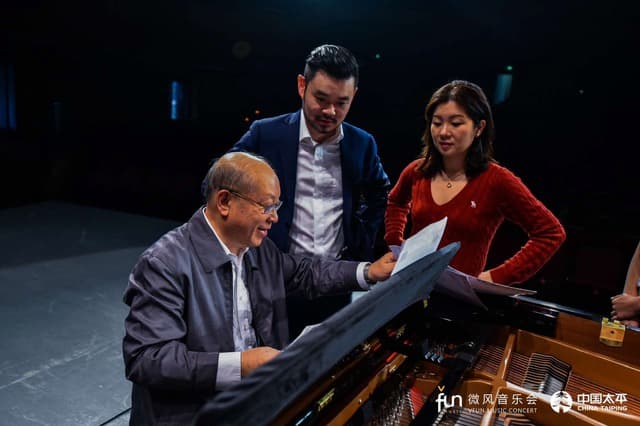
Vivian and her husband, Prof. Jay Sun, and her father
There are my other three very important teachers who have influenced me a lot. The first one is the famous French pianist Monique Duphil I mentioned. She treated me like her granddaughter. She practiced with me for at least three to four hours every day. Mrs. Nancy Weems and Mr. Horacio Gutierrez, two teachers I met during my master’s and doctorate at the University of Houston, also influenced me deeply. They are like family to me. I remember the first time I met Mrs. Weems; she brought me to dinner and invited me to stay with her at her house. After that, we started to have lessons and auditions together. I had my wedding just before my DMA graduation, followed by my first full-time position as a piano teacher. Having all three of them come to my wedding (Mr. Horacio flew from New York, and Monique flew from Oberlin) really touched me. It gave me strong motivation to become a good teacher with a close relationship with my students.
What are the best moments in your life as a teacher?
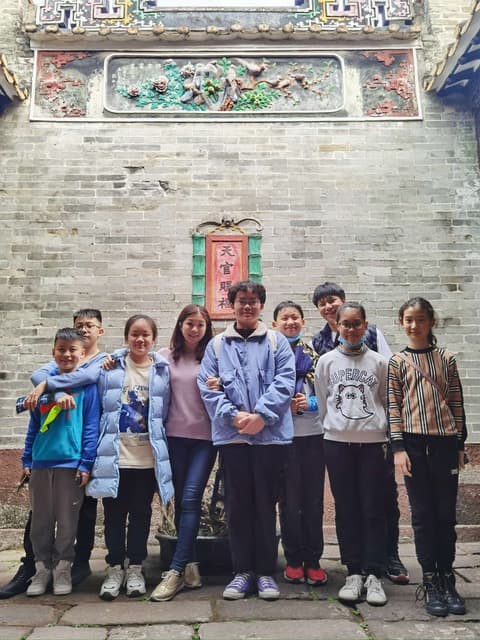
A picture of her with her students at her family home
There are too many of them in different aspects, different levels of being memorable. I just came back from a trip with my student, Hao Rao. We went to Chengdu for his concert. During the day, he suddenly asked me to go hiking with him, so we went. It is one of the happiest moments I have had with my students, and many of them always happened casually. I always enjoy connecting with my students as they are like my family members. Of course, there are many moments that I am proud of them, like seeing them on stage or just making good progress. I think being a teacher is one of the best jobs, even though I don’t see it as a job at all. My students come to my studio every day, and sometimes, they stay there, like Hao Rao.
The interview took place on zoom, and due to the time difference between China and the States, Vivian and I met when it was after 10:30 pm in China. She told me she just finished a 5-hour-long lesson with Hao Rao.
Do you always travel with students for competitions and concerts?
Basically, I travel with my students for all the major competitions, including the junior ones. One of the reasons I travel with them is because I need that information for me to help them develop better. Through listening to them in the competition as an audience, I know later on how to choose the right repertoire for them for competition. And of course, I am there to encourage them to take care of things like meals, travel, and everything else, so I am like both a maid and teacher at the same time. I also teach them manners of how to be presentable when they are asking for comments from the jury and remind them to make friends. Children in China could be timid due to the language barrier, and they might be afraid to open up in a foreign situation, so that’s why it’s important for me to bring them there and to encourage them and show them how to open up in a different country. I always take them sightseeing first when we are in a different place and sample all the local food to make them feel comfortable.
Would you like to share your experience teaching Hao Rao?
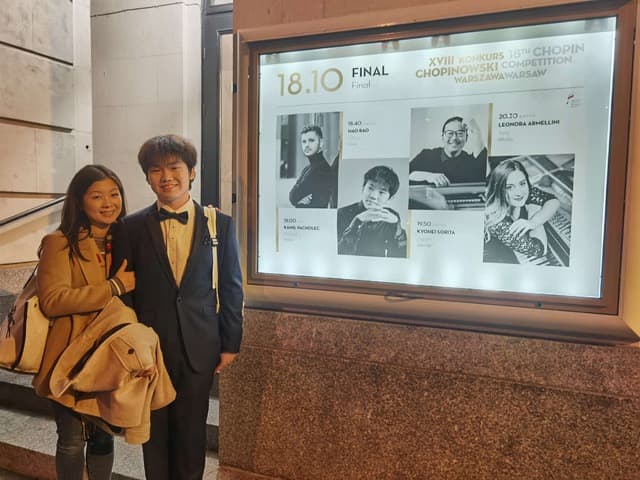
Vivian and Hao Rao, taken at the Chopin Competition after his final
That is also a long story because I taught him since he was eight. The first time I heard him, I noticed he was extremely physically and musically connected. He is from a tiny town in Hunan, so he didn’t have a very good foundation. But he learned very quickly, and very soon, he had fixed everything, and we started building pianism and big repertoires. Every week, his mom took him to Guangzhou to see me. It took them 32 hours back and forth from Hunan to Guangzhou. In the documentary, she showed all the train tickets she had kept for the trips for lessons, and it was touching for me. I still remember the first time they came; they came with the luggage. They always took an overnight train so Rao would have a lesson with me the next morning. After a few hours of lessons, in the middle of the afternoon, they returned to the train station and took another overnight train back home so that he could arrive just on time for school the next morning. They did that for four years until Rao moved to Guangzhou to study in middle school. I can’t believe he’s already a second-year college student! He is a very brave and sweet boy with a wonderful personality. He is very hard-working and devoted, but he also knows how to have fun, which shows a lot in his music. He has a hectic schedule. Last year, he played, I think, like 80-something concerts, including solo and with orchestra. We have to work almost every day with different repertoire. He never gets nervous on stage because he loves being on stage to share his music. He doesn’t care about how people judge him. Everyone envies him, and I envy that, too.
Vivian shared with me how she was very proud and nervous when she watched Rao play during the Chopin Competition.
I have to thank him for everything and for giving me that once-in-a-lifetime moment as a teacher. I’m also very grateful for all my other students.
Vivian is a devoted teacher who is loved by her students and their families. While she might not give lessons during Chinese New Year, she would celebrate with her students. When chatting with her, I could feel her friendliness and openness that studying with her would be a real treasure.
For more of the best in classical music, sign up for our E-Newsletter




